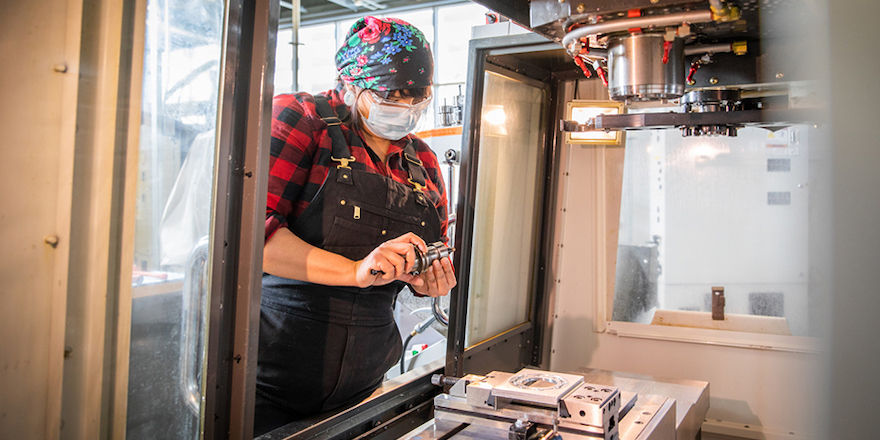NAIT’s New Efforts Aim to Make Trades More Diverse and Inclusive
NAIT's Next in Trades is a free series of workshops for those who are underrepresented in the skilled trades.

There’s a lot of work to be done in Alberta in the coming years but, currently, not enough workers to do it. In fact, there’s a shortage today, with about 100,000 vacancies in the province at the end of 2022.
As dean of NAIT’s School of Skilled Trades, Matt Lindberg (Plumber ’01) believes he knows the source — and it’s not going to be what it was in the past. “It's been long recognized that the apprenticeship spectrum doesn't truly reflect the diversity that we have,” he says. With the shortage looming, “we can't continue to rely on the single white males that have dominated apprenticeship to fill these needs. And nor is it right for us to be doing so.”
NAIT’s Next in Trades
To that end, the school is launching Next in Trades, a series of workshops and programs to highlight career opportunities for groups traditionally underrepresented in the field. The key is ensuring that the trades — in the classroom and at the jobsite — provide a welcoming space for everyone “regardless of background.”
Here, he shares his perspective on how change will happen and the impact it will have not just on those looking for a rewarding career but on the province itself.
How do you think the trades came to be the way it is?
I think it's just historical practice. Back in the ’50s and ’60s, it was traditionally that the male who went off to work and the women stayed home. And so, you create a culture that continues to have a male-dominated workforce.
In other areas, they've been successful in being able to diversify that workforce. Now is the time for us to be focusing that effort on skilled trades. It should have happened decades ago.
Are the trades starting to move in that direction on their own? Or do we need more trailblazers from underrepresented groups participating to help advance progress?
I think it's both. There are some large organizations that are focused on diversity and will not tolerate any type of discrimination. They've got a diversified workforce that helps bolster new ideas and new ways of doing things, and [they’re] creating a culture where all of those folks with different backgrounds and perspectives are going to contribute to a more resilient organization and a more resilient workforce.
And we've got some [organizations] that are coming onto that path but haven't gotten to that point yet. We need to be working with [underrepresented] folks who are coming into this to say, ‘There is opportunity, there is a career. Are you going to face adversity? Probably. How can we support you so, when you encounter that, it isn't a barrier to you progressing?’
Recent legislation changes around apprenticeship training seem like they’re going to open the door to more opportunities to participate.
Absolutely. We're going to see a more diverse group making its way into the apprenticeship system. We still have a lot of organizations that are going to continue to partner [apprentices] with a journeyperson who signs off on all of their competencies.
But an apprentice no longer needs to be sponsored only by a journeyperson. We've become sponsors at NAIT. We can make sure apprentices understand what they're going to experience as they go through their first period of education, and make sure they've got funding in place. We also work with industry partners who are currently recruiting for apprentices, so there might be employment opportunities with those organizations.
What have we done at NAIT to make our apprenticeship classrooms more welcoming?
We've provided different training and we have different resources on campus for our instructors and for our students. From an international perspective, our students have more access to the International and Intercultural Community Centre.
From an instructional perspective, we've had so many conversations and some really great training opportunities for folks who are going to be interacting with a more diverse group of individuals.
Another thing that has helped drive change is the diversity in the folks who are coming in to be instructors within our programs. We have female instructors come into our programs, for example, and female leaders who are chairs of apprenticeship programs. Twenty years ago, that would have been very rare.
What will real diversity in the trades look like?
Real diversity looks like the same type of community diversity that we see in our Edmonton region. We should be seeing the same ratios as what we've got for the LGBTQ+ community, Aboriginal communities, people of color — all of that should be truly reflective of what we actually see in our community.
So, if you’re interested in the trades and come from an underrepresented group, make sure you sign up for our upcoming workshops on March 18 and 25 where you can explore your potential and discover a career that works for you in the skilled trades.
Learn more about NAIT’s Next in Trades